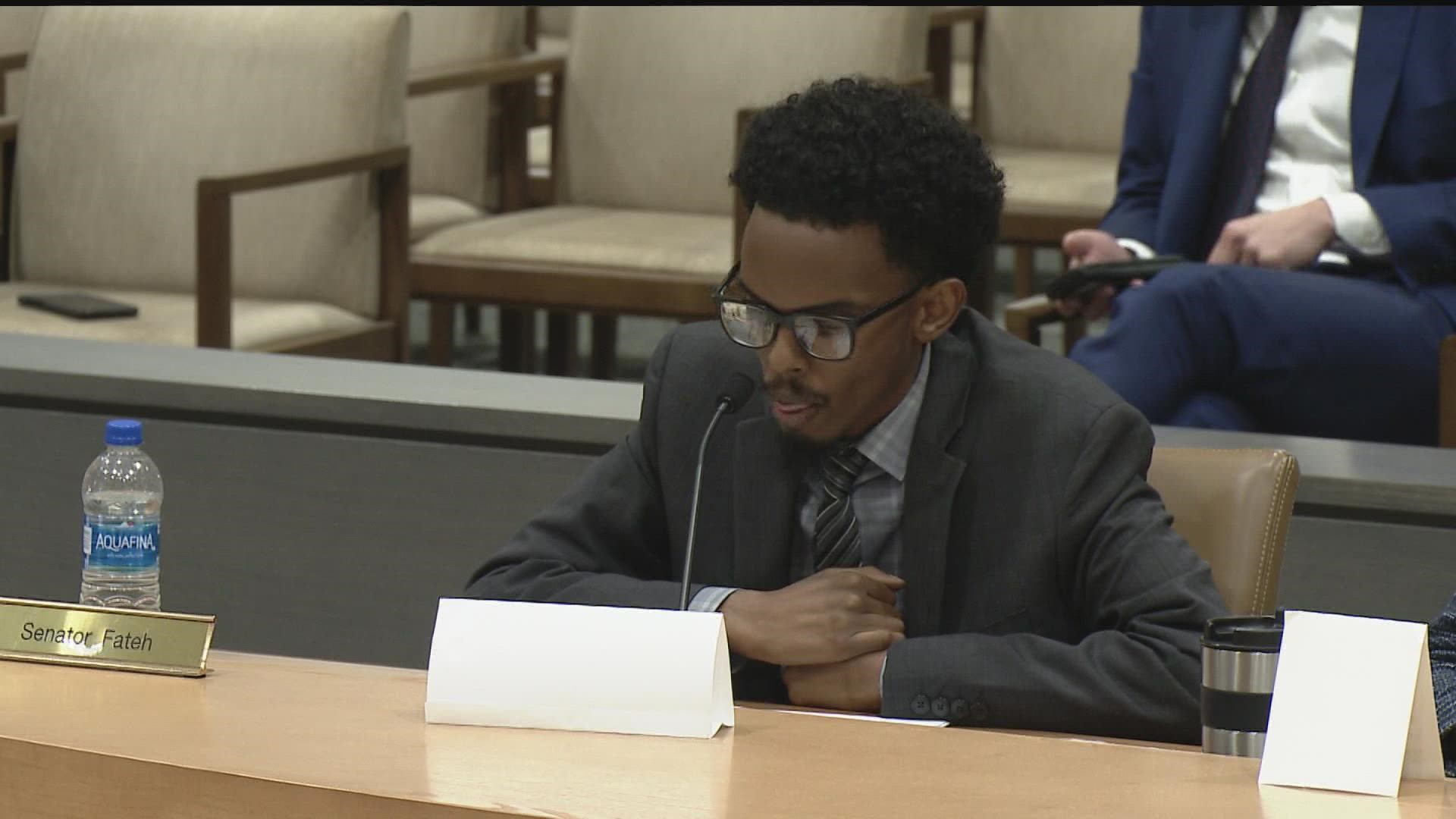ST PAUL, Minn. — Senator Omar Fateh Wednesday spent another day sitting at the witness table, answering questions from fellow senators about his 2020 campaign.
The freshman Democrat from Minneapolis repeatedly insisted he ran an ethical campaign and wasn’t aware of any misconduct or irregularities at the time. Sen. Fateh and his attorney Kristin Hendrick appeared for the second week in a row before the Senate Subcommittee on Ethics.
"We worked really hard to run our campaign with the utmost integrity," Sen. Fateh told the committee.
"I did not directly or indirectly encourage anybody to act improperly at any point."
The Republicans have lodged two formal ethics complaints against Fateh, related to his successful 2020 DFL primary campaign against incumbent Senator Jeffrey Hayden. The bipartisan panel’s first task is to decide if there’s enough evidence of wrongdoing to launch a formal investigation.
Much of Wednesday’s hearing centered on the second complaint, namely that Fateh didn’t react quickly enough in May when his brother-in-law Muse Mohamud Mohamed was convicted of lying to a federal grand jury about absentee ballots.
"We need to know because of a series of coincidences involving Senator Fateh’s campaign and his campaign office," Sen. Scott Newman, one of the Republicans who lodged the complaints, told the panel.
According to the US Attorney’s Office, the grand jury was examining this issue of agent voting, whereby voters give their absentee ballots to a third party to deliver to the election office. In Minnesota a voter can legally serve as the agent for up to three other voters.
Mohamed told the grand jury he delivered absentee ballots on the behalf of three voters, but those voters told the jury they didn’t know Mohamed and never authorized him carry ballots for them. Republicans keyed on published reports that Mohamed told the jury he got the absentee ballots from someone named "Dawson" at the campaign office.
Fateh’s campaign manager at the time was Dawson Kimyon, who later served as Fateh’s legislative assistant in his Minnesota Senate office. Sen. Fateh said he had no prior knowledge of any schemes with absentee ballots prior to Mohamed’s conviction. The Senate DFL Caucus placed Kimyon on administrative leave after the story emerged.
"The complaint is that Senator Fateh didn’t jump up and down loud enough, quickly enough, move forward quickly to getting rid of Dawson Kimyon quickly enough," Fateh’s lawyer Hendricks told the panel.
"It is neither the norm nor the policy of the Senate to compel or dictate that senators denounce other individuals."
Hendricks pointed out that no charges have been leveled against Fateh himself, and that nobody from his campaign has been charged with violating election laws. Fateh told his fellow senators he wasn't asked to appear before the October grand jury or May jury that heard the perjury case against Mohamed.
Subpoenas issued
The committee voted to subpoena two witnesses for their next meeting July 7. They want to question Dawson Kimyon, a senate staffer who served as Fateh’s campaign manager in 2020. They also want to hear from Siyad Salah, the president of the Somali TV YouTube channel who received Fateh’s payments for ads he placed on the channel.
The committee is also seeking a transcript of Muse Mohamud Mohamed’s testimony to the grand jury, to determine if his comments about "Dawson" providing the ballots can be verified.
The panel is composed of two Republicans -- Sen. Dave Osmek and Sen. Mary Kiffemeyer -- plus two Democrats -- Sen. Bobby Champion and Sen. Patricia Torres Ray. If they deadlock on a two-to-two vote the process will come to a halt.
Somali TV issue
The first complaint by the Republicans is an allegation that the Somali TV YouTube channel gave Fateh free advertising, and that he tried to return the favor by sponsoring a bill that would’ve given Somali TV a $500,000 cultural grant to expand services.
Hendricks and Fateh have both said that he paid for running campaign ads on the channel, and that he sponsored several much larger appropriations bills for other organizations. Fateh produced Cash App receipts showing two $500 payments to Siyad Salah for Somali TV ads, on June 20 and July 4 of 2020. He also gave the committee an affidavit from Salah saying the was not given free exposure on the channel.
"There was no free campaign promo and subsequently no quid pro quo," Hendricks said.
Fateh did make the error of paying for the ads out of his own bank account without listing it on his 2020 campaign finance reports. He has since amended those reports to show the payments and listed them and in-kind contributions from himself to his campaign.
Megan Engelhardt, a staff member for the Minnesota Campaign Finance Board, told the committee that paying for something in a hurry out of personal funds is a common error by candidates. She said the most prevalent example of personal expenditures is buying bottled waters for campaign volunteers in the spur of the moment.
The Republicans leading the charge remain skeptical because there were no "paid for by" disclaimers on the Fateh campaign videos that ran on Somali TV. They're also questioning how an entity registered as nonprofit can accept money for political advertising.
"The owner of the Somali TV station gave contradicting statements in the Minnesota Reformer and throughout the affidavit about providing free services," Sen. Mark Koran told the panel.
"Someone from Somali TV should be called in to testify. Senator Fateh’s own statements confirm many free ads are provided by this company."
Watch more local news:
Watch the latest local news from the Twin Cities in our YouTube playlist:

